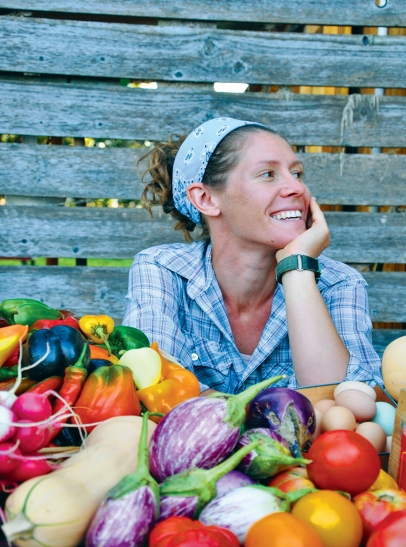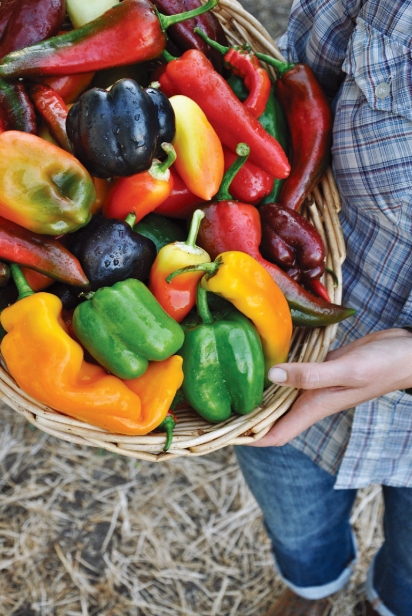A Collaborative CSA Rises Near Iowa City
This is not news: small farms are overworked, underpaid and access to resources like land, labor and funding are minimal. In response, a group of Iowan farmers have formed a model coop, creating a collective to streamline a system for gathering and distributing farm goods in eastern Iowa. Their model also helps makes it easier for small, rural, and/or beginning farmers access markets by removing competition and promoting collaboration. Through their cooperative model “Green Shares CSA” is able tolessen the risk and responsibility of a single farm or farmer with the added benefit of being able to offer customers a broader selection of products. Three organic vegetable farms (Muddy Miss Farms, Mogo Organic, and Dirty Face Creek Farm) are on board with Green Shares CSA, with an all-natural, pastured pork and chicken operation in Tama called Turkey Foot Farm rounding out the offerings. Green Shares also collaborates with and purchases from Echollective CSA and other area small farmers.
This cooperative model is key to connecting more farmers with buyers and fostering a healthy atmosphere for small farms to thrive in every locale. Shanti Selz of Muddy Miss Farms and Morgan Hoenig of Mogo Organic share their story in hopes of inspiring other farmers to team up:
Collaboration not competition - how did this group come together? And why?
Morgan: 2012 was a really hot and really dry year. Mogo Organic had a single farm CSA and distributions were not very bountiful that year… it also caused the farmer a lot of stress! CSA farmers are the ultimate multi-taskers - growing and managing 30-40 types of crops, writing a cheery newsletter with recipes, bookkeeping, and managing a farmers market stand. 2012 was the last straw for Mogo Organic’s single farm CSA. The season pooped me out! The following winter, I was approached by a couple of other organic vegetable farmers who wanted to start a CSA, but they wanted help because they had never done a CSA... so we decided to collaborate on a CSA, splitting up the administrative tasks and splitting up the growing responsibilities. One farmer became the accountant, one farmer did all of the marketing and newsletter, and the other farmer coordinated the crops and decided what was going to be in the CSA shares each week. A CSA is really really hard do it all by yourself, especially the administrative stuff. Everybody wants to spend more time growing, and less time behind the computer!
Shanti: Muddy Miss Farms joined Green Share in 2014. MMF was seeking to rent more certified organic land to expand our operation. One of the cooperative members had 34 certified acres available to rent. It made sense that MMF would join the Green Share collaboration and share in the efforts and MMF was bringing a very well established market in the Iowa City to the collective. In 2015 we incorporated and are now working as Green Share LLC.
What are some of the advantages to this model for the growers? For the consumer?
Grower advantages:
Morgan: Because of the collaboration, we were able to spread out our crop rotation. Mogo had a bad squash bug problem in her fields year after year… and with the partners involved in the growing, Mogo could stop growing squash for a couple of years, reducing the squash bug population. We are also able to create a marketing and distribution network. Since our farms are spread out over a 65 mile radius, our customer base is expanded as well. Customers benefit from the collaboration because the group of farmers have more growing power, more diversity of product, and if there is a crop failure on one farm, the other farm may be able to fill the void.
Shanti: Small-scale vegetable farming is a very difficult pursuit, and there is so much more to it than just growing the food. As a cooperative we share administrative duties such as marketing, book keeping, sales, distribution, etc. Although we all maintain our own farms and farm businesses, we work as a team to make sure we are all doing the best we possibly can. If one farm needs help or if there is an emergency, we have each other to rely on. We share equipment, buy seed and materials together in bulk (cheaper), run errands for each other (if I’m already going somewhere I will pick up what others need). So many of the little things that folks might not necessarily think of as farming but there are only so many hours in the day and having help is essential.
Consumer advantages:
Morgan: Customers benefit from the collaboration because the group of farmers have more growing power, more diversity of product, and if there is a crop failure on one farm, the other farm may be able to fill the void.
Shanti: We all grow many different types of crops. The coop is a place where all of our products are aggregated to create a much broader selection than one farm could likely do alone. Because the farms in our cooperative span about 65 miles and four counties, the slight differences in our climates allows for the seasonal availability of our products to be expanded by a good number of weeks on each side of the season. Many of our customers also like the idea of supporting a cooperative model when they buy from us.
What are some of the challenges of the cooperative model?
Morgan: The challenges are similar to any other projects that involve more than person. You have to try and be fair and allow each farm equal opportunities, you have to be timely and work with others’ schedules, you have to be respectful and friendly even when you are feeling stress.
Shanti: As with any collaboration - communication is key! There is definitely a lot of time spent on writing emails, sending texts, phone calls, coordination, etc. Also being that our farms are somewhat spread out, we have to drive around a lot, although driving is pretty inherent to market farming!
What were some of the unexpected or surprises/bonuses to the cooperative model?
Morgan: Vegetable farming can consume your life.. early mornings harvesting, maintaining weeds and bugs over many acres, and late nights washing and packaging veggies... a job full of stress. So it’s nice to know there’s someone in that stress-boat with you. We can vent to each other, we can buy seed and inputs in bulk, we can help each other out when there’s a big planting or harvest day. There are endless benefits to team-work.
Shanti: Community! This work (farming) is so rewarding but also so challenging. There is always more work to do than time, things to be fixed, things to be sorted out, bought, maintained, installed etc. And on top of that we still need to grow, harvest, and sell the food! Just having folks that you can pick up the phone and ask a question to, or know that if you need help with something major there are folks there to do it – it help so much. And that we are all benefiting from working together. Farming is truly a community endeavor, and I believe the long-term sustainability of small farms like ours is dependent on farm networks - rather than what I call “farm islands”. We don’t need to be doing this all alone.
How do you share administrative duties, equipment, land, and resources, etc?
Morgan: I do the bookkeeping and website work, Shanti does the marketing and PR work. we focus on our strengths. We each have our own farm identities, but we sell collectively to restaurants, at farmers market and through the CSA. The farmer who markets the product gets a commission on any product that isn’t theirs, which is cheap compared to the price of gas and time it would take for me to drive up to Iowa City to sell the product myself. We have purchased some equipment collectively that the Green Share farmers are able to share… like a plastic mulch layer and a crop lifter. Farm implements are expensive purchases when you are a single farmer, so sharing equipment works great!
Shanti: The sharing of administrative duties is key! Morgan is the spreadsheet master and has taught me a ton about book-keeping. I have a lot of good community connections in Iowa City, our main market, and am able to market and sell what we produce. We share our individual equipment if someone else needs to use it, we rent land from each other, and share countless resources. For example Nick from Turkey Foot Farm is helping me build a walk-in cooler right now - sharing his tools and extensive knowledge. I couldn’t do it without him!
What advice do you have for other growers who might be considering this kind of cooperative model?
Morgan: Put all agreements in writing and take time to do lots of planning up front! When the season hits anything unplanned can go out the window!
Shanti: Although I very much support the cooperative model, it is important as an individual business owner that you are getting involved with folks who are of a similar mind and commitment as you. You all have to be in it together, and for the long-haul, or it will never ultimately work. Also, absolutely agree with Morgan, get everything in writing up front! Hand shake agreements are easily forgotten when the season gets crazy and everyone is stressed. Contracts preserve relationships!
Green Shares CSA is hosting a PFI (Practical Farmers of Iowa) Field Day about Cooperative CSAs on Monday, July 6th at Mogo Farms: 2542 Iowa Avenue in Mt. Pleasant. They can also be found at the Iowa City Farmers Market on Wednesdays and Saturdays throughout the season May-October.






